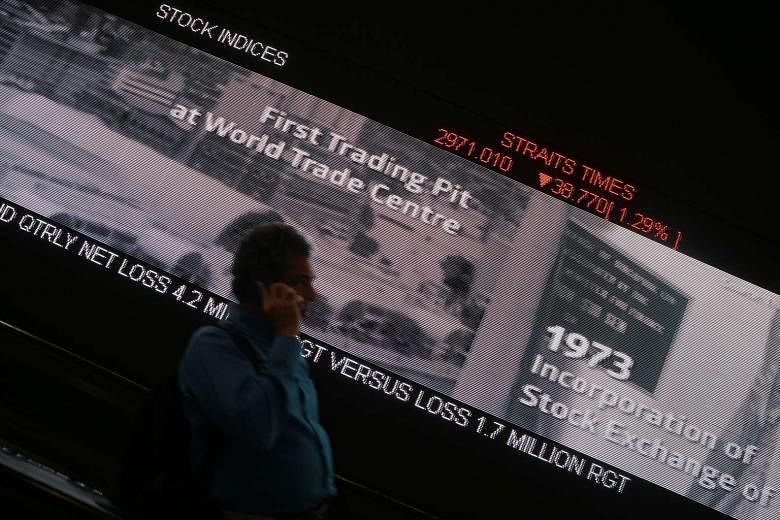SINGAPORE - Why do investors appear to be running scared of the Singapore stock market? That is the question which traders must be asking themselves as they watch the benchmark Straits Times Index plummeting in 12 of the 13 last trading sessions.
Sure, the market has traditionally hit a bad patch in May as the corporate reporting season draws to a close and there are precious few nuggets of good news to lure investors into loading up further on stocks.
But the dour sentiment observed this year appears to be much worse than what was experienced in the past five years. Trading has slowed down considerably since April as traders avoid taking new positions.
For example, Tuesday's turnover of $913 million was 8.7 per cent down on April's daily average of $1 billion which was itself a 21 per cent drop from the turnover registered a year ago.
The only redeeming grace is that while buyers are few and far between, sellers are holding their fire. This has given the STI some breathing space as it glides gently down by about 7.8 per cent from April's closing high of 2,960.78 without, in recent times, suffering the usual stomach-churning turmoil that accompanied its previous descent.
One obvious culprit for the lacklustre state of the stock market is the slew of negative local economic data which has been making the headlines, such as the sharper than expected 15.6 per cent drop in March's non-oil domestic exports.
But it is the international front which may be a bigger cause for concern.
True, the latest jobs report in the United States last Friday showed that payrolls only gained 160,000 last month, and this may just stay the hands of its central bank from engineering another round of rates hike when it meets next month.
However, this may also suggest that the gigantic US economy is nowhere out of the woods yet. This is bad news for exporters - including those from Singapore - which rely on the US consumers to buy their products.
Then there is the perennial worry at our own backyard: China reported over the weekend that imports had plunged almost 11 per cent in April, as compared with a year ago, while exports fell 2 per cent in the same period.
This has again fuelled fears of a hard landing in the Chinese economy - a worry which manifested itself with a 3 per cent drop in the Shanghai stock market on Monday.
There is another worry worth highlighting: the huge flow of funds out of the international stock markets last week and the long shadow this casts over our relatively small market.
Even though Wall Street has been holding up of late, the nervousness of investors is reflected by the manner in which they have been reducing their exposure to US stocks.
The latest global fund flows update from OCBC Bank shows that US equity funds suffered a massive redemption of US$13.4 billion last week. This marks the biggest outflow in a week from funds investing in US stocks since last September.
In the Asian market space, equity funds investing in China stocks continue to bear the brunt of the sell-off, experiencing a net redemption of US$454 million last week.
Now why the nervousness?
The recent quarterly corporate reporting season in the United States offers no solace for investors with earnings per shares likely to show a decline of 5.1 per cent for the full year.
Politics-wise, the current spate in STI's losses remind some traders of a similarly long bearish stretch in the STI six years ago when Greece was unable to balance its books and triggered the first eurozone crisis.
While Greece remains firmly within the fold of Europe, a "Brexit" is a distinct possibility as Britain goes to the poll on its European Union membership next month - thus triggering even more uncertainties and further investors' aversion to stocks.
But the biggest surprise may await us all in November, as the US chooses a new president.
Wall Street stays sanguine that former senator Hillary Clinton will be chosen as the next US president but the electoral setbacks she suffered during the recent Democratic primaries in Indiana and West Virginia suggest that there should be no room for complacency.
What happens if New York property tycoon Donald Trump does get elected as president?
I am sure analysts are busily working out the fallout if he carries out threats like replacing the highly-respected Janet Yellen as chair of the Federal Reserve. But this sure is one prospect which Wall Street does not relish.
Where does that leave us?
Investors are staying out because the uncertainties make it impossible for them to adopt a stand as to where the market is headed. But the gentle decline in the STI may well presage a more serious market dislocation ahead. Watch this space.


